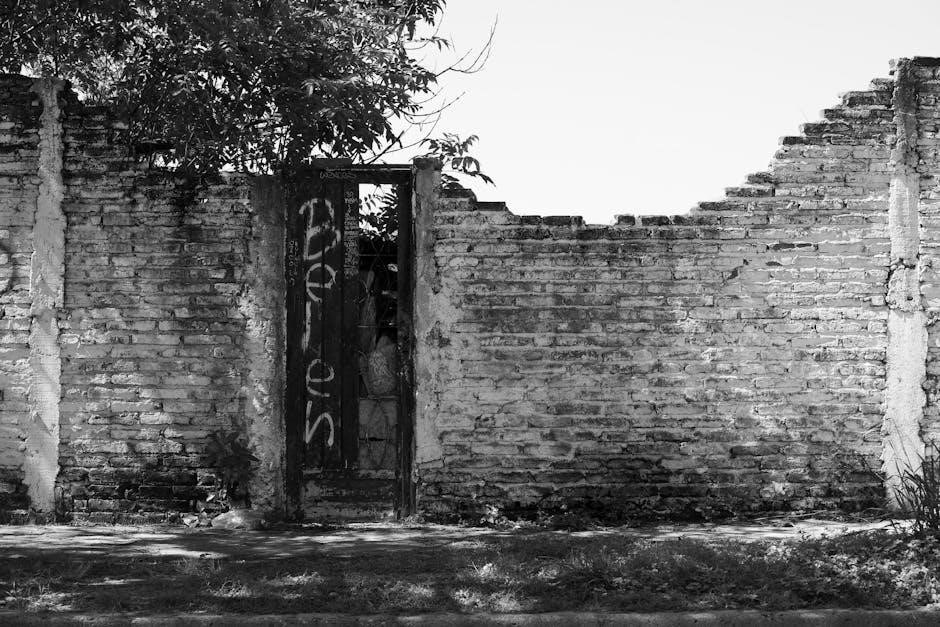Slouching Towards Bethlehem, Joan Didion’s seminal 1968 essay collection, captures the essence of 1960s California, exploring themes of societal upheaval and personal disillusionment with lyrical precision․ The title, inspired by W․B․ Yeats’s The Second Coming, reflects the era’s chaos and transformation․ This work remains a timeless commentary on American culture, now widely available in PDF format for modern readers․
Overview of Joan Didion’s Essay Collection
Slouching Towards Bethlehem is Joan Didion’s groundbreaking 1968 essay collection, offering a vivid portrait of 1960s America․ The book comprises 20 essays, each exploring themes of social upheaval, countercultural movements, and personal reflections on American identity․ With her signature lyrical prose, Didion examines the decline of traditional norms and the rise of a chaotic, fragmented society․ Her observations, particularly in essays like “Slouching Towards Bethlehem,” capture the essence of an era in crisis․ The collection is celebrated for its sharp insight and literary brilliance, making it a cornerstone of American nonfiction․ It remains widely read and is available in PDF format for easy access․
Historical Context and Significance of the Title
The title Slouching Towards Bethlehem is drawn from W․B․ Yeats’s poem The Second Coming, which evokes a sense of impending chaos and societal collapse․ Published in 1968, the collection captures the turmoil of America during the late 1960s, marked by civil rights movements, the Vietnam War, and countercultural upheaval․ The title reflects the era’s existential unease and the dissolution of traditional values․ By invoking Yeats’s imagery, Didion underscores the fragmented state of American society, where the “center was not holding․” This historical context gives the collection its enduring relevance, offering a poignant lens through which to view a nation in crisis․ The title encapsulates both the literary inspiration and the cultural zeitgeist of its time․

Background of the Book
Slouching Towards Bethlehem emerged from Joan Didion’s experiences in 1960s California, capturing the state’s cultural and social upheaval․ Her essays reflect a nation in flux, blending personal observation with societal critique, offering a vivid portrait of an era defined by counterculture and change․
Joan Didion’s Experiences in 1960s California
Joan Didion’s essays in Slouching Towards Bethlehem are deeply rooted in her observations of 1960s California, a time of cultural and social transformation․ She delves into the counterculture movement, exploring the lives of young people in Haight-Ashbury, their ideals, and their struggles․ Didion’s experiences during this period shaped her critical yet empathetic perspective on the era’s upheaval, offering insights into the decline of traditional norms and the rise of a new, uncertain reality․ Her writings capture the essence of a generation grappling with change, making her work a significant commentary on American society during this pivotal decade․
Inspiration from W․B; Yeats’s “The Second Coming”
Joan Didion’s Slouching Towards Bethlehem draws its title and thematic inspiration from W․B․ Yeats’s poem The Second Coming․ The poem’s apocalyptic imagery, particularly the line “And what rough beast, its hour come round at last, / Slouches towards Bethlehem to be born?” resonates with Didion’s portrayal of 1960s America․ Yeats’s exploration of chaos and the collapse of order mirrors Didion’s observations of societal fragmentation and moral decay․ By invoking this literary reference, Didion underscores the idea of a nation in crisis, grappling with its own disillusionment and the erosion of cultural certainties, echoing the poem’s haunting vision of transformation․

Key Themes and Essays
Slouching Towards Bethlehem explores the counterculture movement, societal unraveling, and personal reflections on American identity․ Essays delve into Haight-Ashbury’s hippie scene, moral decline, and individual disillusionment, offering sharp social commentary․
The Counterculture Movement in Haight-Ashbury
Joan Didion’s essays vividly capture the heart of 1960s Haight-Ashbury, the epicenter of the counterculture movement․ She observes the communal lifestyle of hippies, their rejection of mainstream values, and their pursuit of freedom․ Didion describes the scene with a mix of fascination and skepticism, noting the tension between idealism and reality․ The essays highlight the movement’s experimentation with drugs, music, and alternative living, while also exposing its flaws, such as disorganization and the naive belief in utopian ideals․ Her portrayal reveals both the allure and the disillusionment of a generation seeking change, offering a nuanced perspective on this pivotal moment in American history․
Decline of Social and Moral Norms
Didion’s essays in Slouching Towards Bethlehem illuminate the erosion of traditional social and moral frameworks in 1960s America․ She depicts a society where conventional norms are increasingly rejected, particularly among the younger generation․ The rise of countercultural movements, communal living, and drug experimentation exemplify this shift․ Didion observes how the pursuit of personal freedom often led to a breakdown in accountability and shared values․ Her writing captures the tension between the idealism of the era and the disintegration of societal cohesion, offering a poignant critique of the moral and cultural upheaval that defined the time․
Personal Reflections on American Society
Joan Didion’s Slouching Towards Bethlehem is a collection of essays that reflect her personal insights into the societal changes of 1960s America․ She chronicles her experiences in California, particularly in Haight-Ashbury, where she observed the counterculture movement firsthand․ Her reflections reveal a society grappling with the decline of traditional norms and the rise of individualism․ Didion’s essays blend her personal observations with broader societal commentary, offering a nuanced portrayal of an era marked by both hope and disillusionment․ Her work captures the complexities of a nation in flux, making her reflections timeless and deeply human․

Literary Significance
Slouching Towards Bethlehem is a landmark collection of essays by Joan Didion, offering a critical exploration of 1960s America, influencing modern nonfiction, and cementing her literary legacy․

Critical Reception and Impact on American Literature
Joan Didion’s Slouching Towards Bethlehem received widespread critical acclaim for its incisive commentary on 1960s America, capturing the era’s cultural and social upheaval․ Critics praised its lyrical prose and sharp insights into the counterculture movement․ The collection solidified Didion’s reputation as a master of literary journalism, blending personal reflection with societal critique․ Its influence on American literature is profound, as it redefined the boundaries of nonfiction and inspired generations of writers․ The book remains a cornerstone of 20th-century American literature, offering timeless reflections on chaos, identity, and the fracturing of social norms during a pivotal historical moment․
Comparison with Other Works by Joan Didion
Joan Didion’s Slouching Towards Bethlehem stands alongside her other works, such as The Year of Magical Thinking and Blue Nights, in its exploration of personal and cultural dislocation․ While her later works delve into grief and aging, Slouching Towards Bethlehem captures the turmoil of the 1960s, showcasing her ability to weave memoir with societal critique․ The collection shares thematic similarities with We Tell Ourselves Stories in Order to Live, her later anthology, but its focus on the counterculture movement makes it uniquely reflective of its time․ This work remains a defining piece in her oeuvre, illustrating her enduring preoccupation with American identity and fragmentation․
Availability in PDF Format
Slouching Towards Bethlehem is widely available in PDF format, accessible through platforms like Perlego, Scribd, and various download sites, offering readers convenience and easy access to Didion’s seminal work․
Downloading and Reading Options
Readers can easily access Slouching Towards Bethlehem in PDF format through various online platforms․ Perlego and Scribd offer the book for subscribers, while free download sites provide direct links․ Some platforms require registration, while others allow immediate access․ The PDF version ensures compatibility with multiple devices, making it convenient for reading on smartphones, tablets, or computers․ Additionally, the digital format preserves the original text’s clarity and structure․ This accessibility has made the essay collection popular among modern readers seeking to explore Didion’s insights into 1960s America․ The PDF format also supports highlighting and annotation, enhancing the reading experience․
Legal and Free Sources for the PDF
Obtaining Slouching Towards Bethlehem legally and for free is possible through reputable sources․ Many university libraries offer free access to the PDF through their databases․ Websites like Project Gutenberg and open-access academic repositories provide downloadable versions․ Additionally, some platforms offer free trials, allowing users to access the book temporarily․ Always ensure the source is legal to avoid copyright infringement․ These options make Joan Didion’s work accessible to readers worldwide while respecting intellectual property rights․ Legal sources guarantee a high-quality, virus-free reading experience, preserving the integrity of the original text for future generations․
Cultural and Historical Relevance
Joan Didion’s Slouching Towards Bethlehem captures the essence of 1960s America, offering profound insights into cultural upheaval and societal shifts, influencing modern nonfiction and remaining historically significant․

Influence on Modern Nonfiction Writing
Joan Didion’s Slouching Towards Bethlehem has profoundly shaped modern nonfiction, inspiring writers to blend personal narrative with sharp social commentary․ Her lyrical yet incisive prose has become a benchmark, influencing generations to explore cultural and political landscapes with nuance․ The essays’ ability to capture the essence of an era continues to resonate, making them a vital study for contemporary writers․ Didion’s work remains a cornerstone of American literary nonfiction, proving that her insights into societal upheaval and personal disillusionment are timeless․ Her unique voice has left an indelible mark, ensuring her influence endures in the evolving landscape of nonfiction writing․
Adaptations and Audiobook Versions
Joan Didion’s Slouching Towards Bethlehem has been adapted into various formats, enhancing its accessibility․ A notable audiobook version, narrated by actress and singer Zoë Kravitz, brings Didion’s essays to life with a contemporary voice․ This adaptation introduces the collection to a new generation of listeners, maintaining the original’s emotional depth and cultural relevance․ Additionally, the essays have inspired numerous interpretations in media and literature, further cementing their impact․ The audiobook format ensures that Didion’s insightful commentary on 1960s America remains engaging and thought-provoking for modern audiences, underscoring the timeless nature of her work․
Slouching Towards Bethlehem remains a landmark work, offering profound insights into 1960s America․ Its exploration of cultural shifts and personal reflections continues to resonate, shaping contemporary discourse on identity and society․
Legacy of “Slouching Towards Bethlehem” in Contemporary Culture
Slouching Towards Bethlehem has left an indelible mark on contemporary culture, influencing modern nonfiction and shaping discussions on identity, society, and politics․ Its themes resonate with today’s societal shifts, making it a timeless reflection of cultural upheaval․ The essay collection’s availability in PDF format ensures its accessibility to new generations of readers, while adaptations and audiobook versions further expand its reach․ Joan Didion’s work continues to inspire writers, solidifying its legacy as a pivotal text in American literary history․

